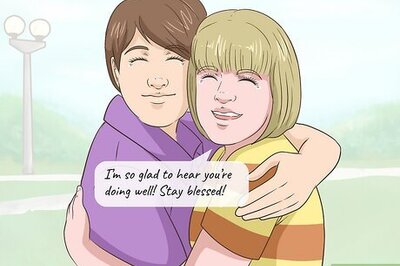No News, No Binging, No 24/7 Work: John Hopkins Doctors Give Mental Health Tips for the 'New Normal'

views
New Delhi: As the COVID-19 outbreak spreads across the world -- having infected over 4.2 lakh people and killed about 19,000 -- governments across the world have never been more insistent on social distancing and self-isolation strategies to restrict the movement of people.
Which is why this coronavirus pandemic has turned out to be a game changer for people's mental health; affecting millions in isolation.
People have been forced to stay indoors, sometimes even separated from their family within their own house, away from co-workers and friends for weeks at a stretch.
However, amid this global health emergency it is equally important to build resilience, and manage stress and anxiety in this “new normal,” the School of Medicine at the John Hopkins University said on Tuesday.
“Anxiety goes up when there is a change in routine. Everyone around us is stressed. So it is important to take one day at a time. If we can manage stress on a baseline and everyday basis, then we are better placed to deal with it during spikes or when things are much worse than today,” said Karen Swartz, associate professor of psychiatry and behavioural sciences.
She was addressing a global webinar to help people cope with stress and social isolation.
The virus has also given the world its first infodemic – an explosion of information on the Internet, as persons hover across various news platforms and the social media to gain information, misinformation and bad information on the outbreak.
This has caused anxiety in many, spikes in the download and use of mental health apps indicate.
Swartz noted that it is important to “limit how much we watch the news.” Persons are advised to go to “credible news sources and not read news before sleep” in order to reduce infodemic stress. “The mind has to disconnect in order for you to disconnect,” she said.
“It is important to create a schedule at a time when we are working from home. There has to be an end to the day. It is important for everyone to not assume that one is working all day and night. Hence, it is important to not work on the bed.”
Cultivating a healthy mental health during the pandemic requires building resilience via better sleep hygiene, meditation and a daily routine. “Resilience predicts the well-being of a person. It is a skill set. You have to exercise it to develop it. If you're less resilient you're likely to take up unhealthy habits like over-eating, anxiety and depression,” said Swartz.
Doctors at John Hopkins Medicine have found that over 40 per cent persons skip meals, lack energy and motivation and do not sleep well during these times.
“We all should attempt to sleep and wake up on time, avoid caffeine intake, have a routine for getting into bed, not exercise at night and have pets in the bedroom,” the psychiatrist added, highlighting how alcohol and drugs use do not help here.
Some other ways to build resilience is through Cognitive Behavioural Therapy (CBT) and Positive Psychology exercises. Exercising, moving around and taking up tasks help change negative thoughts to positive, aid behaviour change to reduce stress and anxiety.
On the other hand, positive psychology exercises in the form of better communication, expressing confidence in everyday tasks and expressing gratitude for what you have in these times of peril, helps train one's attention to go from negative to positive.
Swartz opined that “if you can control your emotional response, you can control your anxiety, anger and frustration.”
Besides formal practices like mindfulness meditation, focused breathing, body scanning and informal practices, including any typical activity with added attention to it, also helps in building resilience.
Focusing on sounds, smells and sights, as part of informal practices, helps build an in the moment experience. There are number of mobile applications like Calm and Headspace that help here, the John Hopkins psychiatrist said.
An integral part of following these practices is by having a daily, structured routine which does not include “binge watching shows, compromising on 7-9 hours of sleep” but instead has a set of “concrete things to do at home.”
“Being sure about who would you call when someone gets sick in your home is part of this organised routine,” said Swartz.
The hour long global webinar reminded everyone to hold strong to our physical and mental health safety as “reducing social distancing does not mean reducing social contact.” People face stigma during infections which cause stress, but the whole point of social distancing is only to not be physically around them.
“There are online ways to stay in touch. We can do things in a solitary way and make it more communal too. We can go beyond conversations around COVID-19. We can be kind towards other people’s experiences,” she added.


















Comments
0 comment